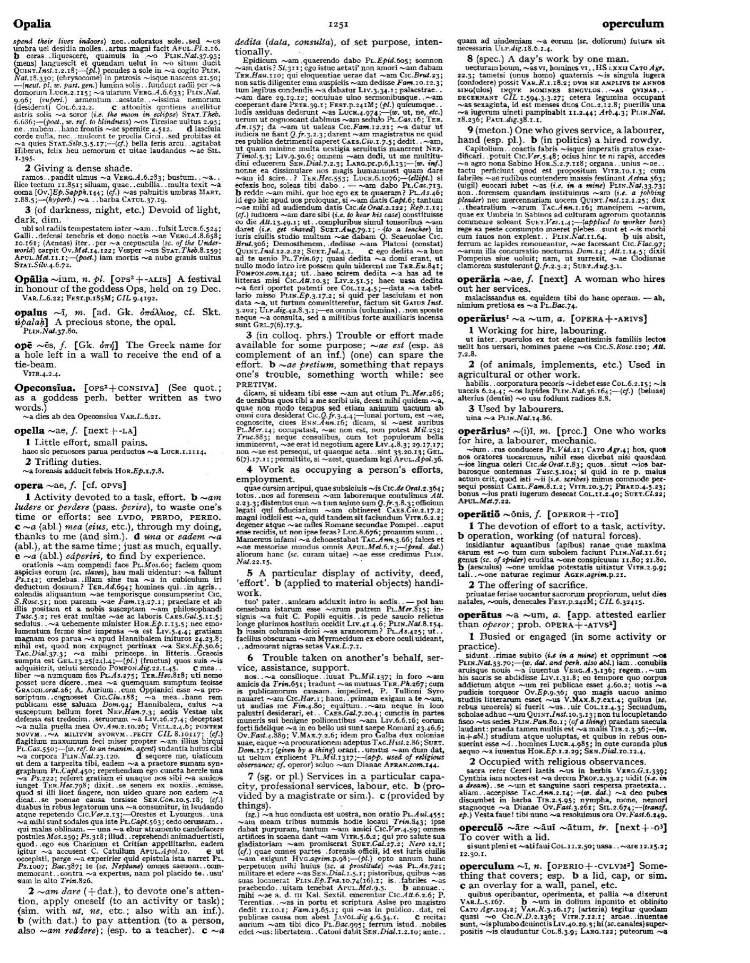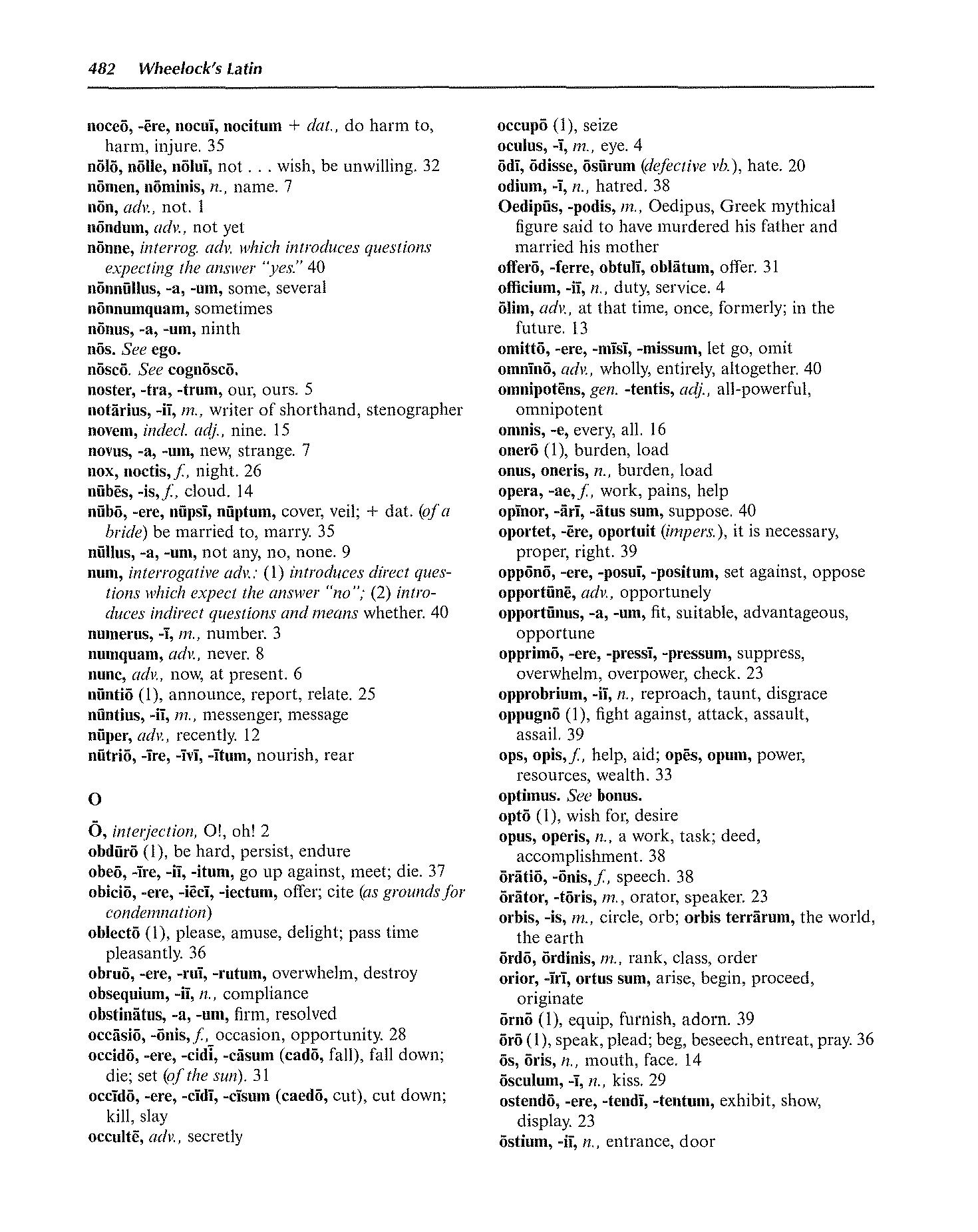
page_listing.tpl
page_subListingDetails.tpl
sub_listingDetails_style1.tpl
sub_listingDetails.title.tpl
opera work
opera is a Latin Noun that primarily means work.
Definitions for opera
Wheelock's Latin
Noun
- 1
work, pains, help
Oxford Latin Dictionary
Verb
- 1
~am dare (+dat.), to devote one's attention, apply oneself (to an activity or task); (sim with ut, ne, etc.; also with an inf.). (b) (with dat.) to pay attention (to a person, also ~am reddere); (esp. to a teacher). (c) ~a dedita (data, consulta), of set purpose, intentionally.
Noun
- 1
Activity devoted to a task, effort. (b) ~am ludere or perdere (pass perire), to waste one's time or efforts: see LVDO, PERDO, PEREO. (c) ~a (abl) mea (ius, etc.), through my doing, thanks to me (and sim.). (d) una or eadem ~a (abl.), at the same time; just as much, equally. (e) ~a (abl.) edperiri, to find by experience.
- 2
(in colloq. phrs.) Trouble or effort made available for some purpose; ~ae est (esp. as complement of an inf.) (one) can spare the effort. (b) ~ae pretium something that repays one's trouble, something worth while: see PRETIVM.
- 3
Work as occupying a person's efforts, employment.
Sentences with opera
Latin to English
Cōnsulī nōn crēdent quī opera turpia faciat.Compare They will not trust a consul who would do base deeds.
Operam dat librīs legendīs.Compare He gives attention to reading books.
Et illa erant fercula, in quibus mihi esurienti te inferebatur sol et luna, pulchra opera tua.Compare Such were the platters on which the sun and the moon, your beauteous works, were brought to me while I hungered for you.
Certo uterque, ut consul opera navo.Compare Both parties strove that help might be given to the consul.
Declension table for opera
Cactus2000
| Singular | Plural | |
| Nom. | opera | operae |
| Gen. | operae | operārum |
| Dat. | operae | operīs |
| Acc. | operam | operās |
| Abl. | operā | operīs |
Data sources
Notes
- Definitions
- Frederick M. Wheelock, Wheelock's Latin, 6th ed., rev. Richard A. LaFleur (New York, NY: HarperCollins Publishers, 2005): 482.
- P. G. W. Glare, Oxford Latin Dictionary, Vols. 1-8 (Oxford: Clarendon Press, 1982): 1251.
- Word frequencies
- Christopher Francese, "Latin Core Vocabulary," Dickinson College Commentaries, last modified 2014, http://dcc.dickinson.edu.
- Paul B. Diederich, The Frequency of Latin Words and Their Endings, PhD diss., (Columbia University, 1939).
- Louis Delatte, Suzanne Govaerts, Joseph Denooz, and Etienne Evrard, Dictionnaire fréquentiel et index inverse de la langue latine [Frequency Dictionary and Inverse Index of the Latin Language] (Liège, Belgium: Laboratoire d'analyse statistique des langues anciennes de l'Université de Liège [L.A.S.L.A.], 1981): 124.
Bibliography
Allen, Joseph H. Allen and Greenough's New Latin Grammar for Schools and Colleges: Founded on Comparative Grammar. Edited by James B. Greenough, George L. Kittredge, Albert A. Howard, and Benjamin L. D'Ooge. Boston, MA: Ginn & Company, 1903.
Crystal, David. A Dictionary of Linguistics and Phonetics. 6th ed. Oxford, UK: Blackwell Publishing, 2008.
Delatte, Louis, Suzanne Govaerts, Joseph Denooz, and Etienne Evrard. Dictionnaire fréquentiel et index inverse de la langue latine [Frequency Dictionary and Inverse Index of the Latin Language]. Liège, Belgium: Laboratoire d'analyse statistique des langues anciennes de l'Université de Liège (L.A.S.L.A.), 1981.
Diederich, Paul B. The Frequency of Latin Words and Their Endings. PhD diss., Columbia University, 1939.
Francese, Christopher. "Latin Core Vocabulary." Dickinson College Commentaries. Last modified 2014. http://dcc.dickinson.edu/latin-vocabulary-list.
Gildersleeve, Basil L., and Gonzales Lodge. Gildersleeve's Latin Grammar: Third Edition, Revised, and Enlarged. 3rd ed. London, England: Macmillan and Co., 1903.
Glare, Peter G.W. Oxford Latin Dictionary. Vols. 1-8. Oxford, England: Clarendon Press, 1982.
Krüger, Bernd. "Latin Conjugation Tables." Cactus2000. Accessed May 5, 2023. https://latin.cactus2000.de/index.en.php.
Pierson, Nick. "Sound of Text." Accessed October 26, 2019. https://soundoftext.com.
Wheelock, Frederick M. Wheelock's Latin. 6th ed. Revised by Richard A. LaFleur. New York, NY: HarperCollins Publishers, 2005.
Wiktionary Contributors. "Victionarium." Wikimedia Foundation, Inc. Updated March 18, 2019. https://la.wiktionary.org/wiki/Victionarium:Pagina_prima.
Citation
Chicago (17th ed.)
Allo Contributors. "opera, operae (n.) - Latin Word Definition." Allo Latin Dictionary. Last modified . Accessed February 20, 2026. http://ancientlanguages.org/latin/dictionary/opera-operae.
Entry created on . Last updated on .







